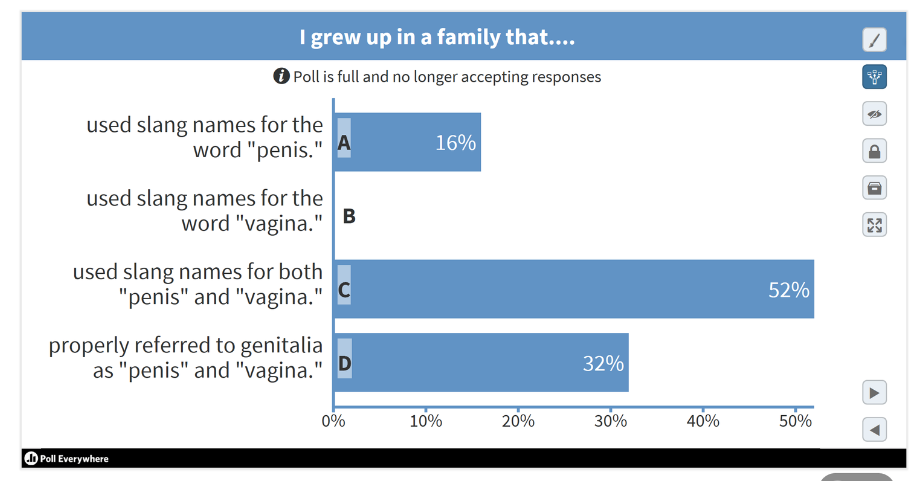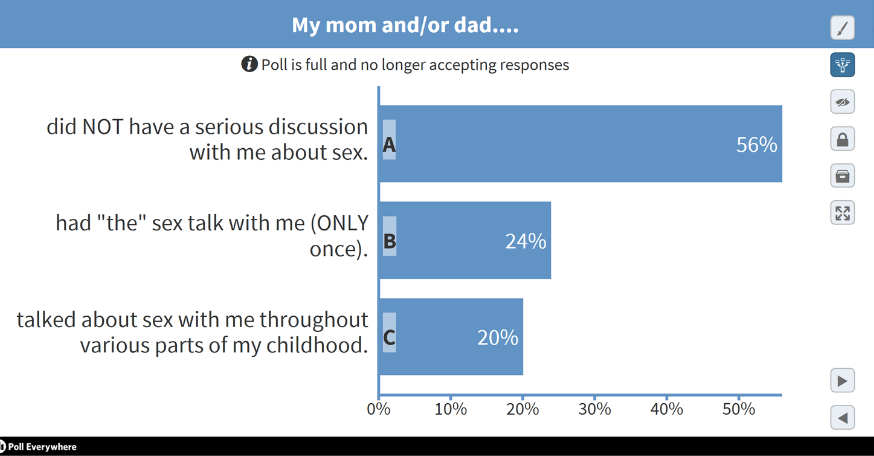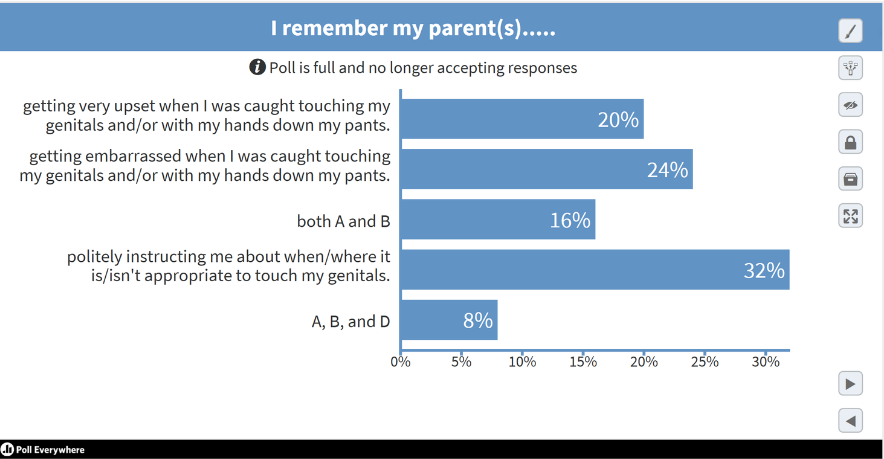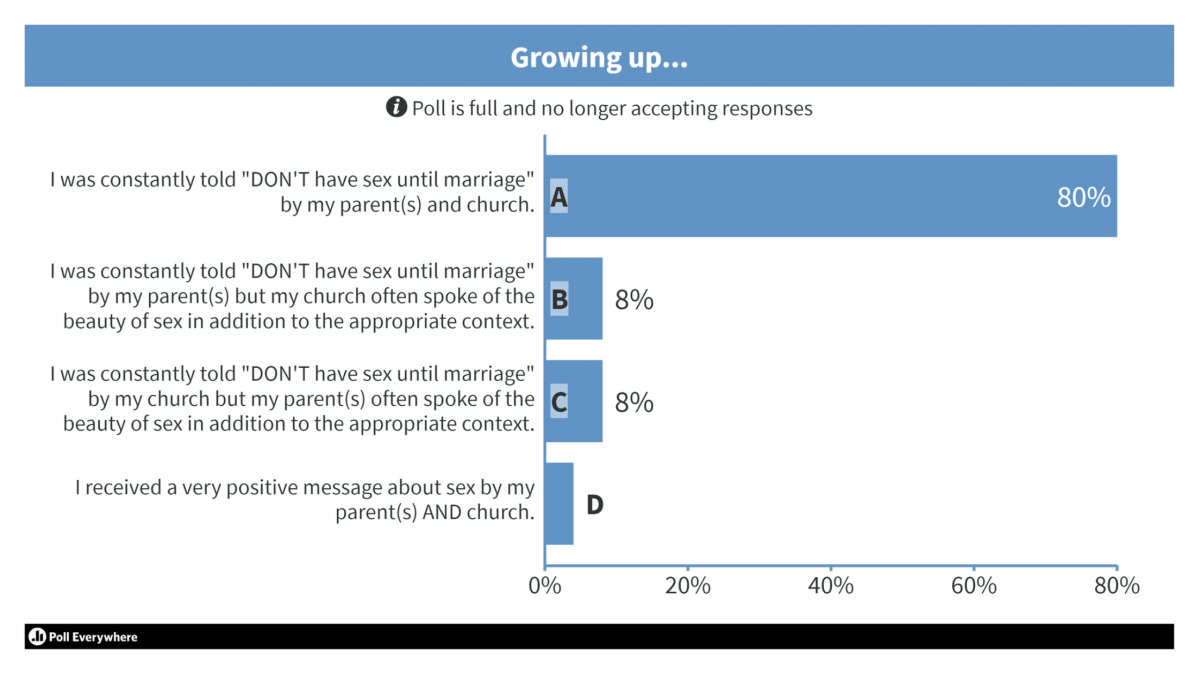
“Sex is DIRTY. Sex is BAD. Save it for someone you LOVE.”
Unknown Source
We, unfortunately, live in a shame-based culture when it comes to sex and sexuality. You may be tempted to challenge this notion considering that we can’t even drive down the street without seeing a billboard with a nearly nude man or woman, or a woman making a provocative face, as to say “I want you!” (note: I am simply keeping it clean if you catch my drift). Sex is everywhere. It’s in magazines, newspaper ads, television programs, etc., etc., etc.
It may seem, in some ways, that our culture has “no shame” when it comes to this issue. I can see how one might assume that; but, I believe that these public displays of sex and sexuality are so prevalent because of the intense presence of sexual shame in our culture, not the lack thereof. Think of it this way. Human-beings are drawn toward the forbidden. In our culture, sex and sexuality have become extremely taboo topics, which gives it more power than it was ever intended to have. The more we avoid this topic, the more we approach it with awkwardness and embarrassment; then, the more desirable it becomes in its forbidden form. In an article by expert therapist, Rob Weiss, he writes:
“…sexual shame is among the most powerful and devastatingly painful forms of shame. As Patrick Carnes has often said, sexual secrets are often the cause of our greatest emotional shame, yet they are the secrets we are least likely to reveal.”
Rob Weiss
C.S. Lewis addresses the spiritual element of this phenomenon in his thought-provoking book, The Screwtape Letters. This work is a series of letters written from master demon (Screwtape) to his demon apprentice (Wormwood). Here is small glimpse of this dark, but fascinating work:
[Screwtape writing to Wormwood] “All we can do is to encourage humans to take the pleasures which our Enemy has produced, at times, or in ways, or in degrees, which He has forbidden. Hence we always try to work away from the natural condition of any pleasure to that in which it is least natural, least redolent of its Maker, and least pleasurable. An ever-increasing craving for an ever diminishing pleasure is the formula….”
C.S. Lewis, The Screwtape Letters
If I were to ask you “do we, as a culture, have an overall healthy relationship with sex and sexuality?” My guess is that I would receive a resounding “NO!” in response. If I were to ask you, PARENTS, “Do you want your children to have a healthy relationship with sex and sexuality?” I am certain I would hear, in response from you, a resounding “YES!” But, where to do we begin?
In this article, I am going to address 4 common parenting practices that, if adhered to, will, no doubt, perpetuate the legacy of sexual shame with one’s children. In preparation for this series, I conducted a non-scholarly poll concerning these parenting practices.
Please note that these polls were conducted through my personal Facebook page; these are NOT empirically validated studies; but instead, a simple effort to illustrate my thoughts and insight on this topic of sexual shame.
Common Practice #1: Parents often use slang terms in reference to the male and female genitalia

This is one of those areas where I get accused of making a mountain out of a mole hill. “What’s the big deal?” people often ask. It may not seem like that big of a concern for you, but think of the message it sends to your children. Using slang terms to reference the “penis” and “vagina” (and other parts of our sexuality) communicates a message of shame. It’s almost as if we are saying, “It is such a dirty and disgusting part that I cannot even bring myself to say it out loud.” If you still are skeptical of these thoughts, then consider this – How come we don’t refer to all body parts with slang terminology? Why do we ONLY limit it to our parts associated with sex and sexuality? #ThingsThatMakeYouGoHmmm
So, what do we do? My encouragement for all parents is to use the proper terms for male and female genitalia (i.e., “penis” and “vagina”) and all other body parts associated with our sexuality. It’s never too late to start! And if your kids ask you why you are saying these new terms, then all that does is present to you another opportunity to fight against sexual shame by having a conversation with your child about the importance of using proper terms when discussing body parts.
Common Practice #2: Parents often minimize how much sex is talked about or discussed among the family.

Many of you reading this have experiences where your parent(s) did not discuss sex with you at all. Others of you may have had one or two talks on the matter. But, very few people experienced the topic of “sex” as an ongoing conversation in their families that, eventually, was carried over into their own families.
As humans, we are designed as sexual creatures. Our bodies are sexual vessels. Our sexuality is a very large part of our existence, but many families will avoid discussions on this matter like the plague. This, again, sends a message to our children that there is something inherently wrong, dirty, and/or shameful about our sexuality.
So, what do we do? Parents can start by being intentional with discussions about sex and sexuality from a very early age. Often this naturally begins by discussing body parts (remember to use proper terminology; no slang), then, as the child grows, this progresses into deeper topics of sexuality. You’ll need to gauge what your child is ready for based upon their age and developmental stage. Here are some topics to get you started:
- Body parts – boys have a penis and girls have a vagina.
- Respecting your body – a discussion on hygiene and cleanliness
- Sexuality in media – respecting yours and others sexuality; a discussion about porn.
- Masturbation and touch – what is sexual nurturance?
- Intercourse – the birds and the bees; how babies are made.
- Safe-sex – discussion on pregnancy and/or STDs.
- The beauty of sex – enough said.
Common Practice #3: Parents sometimes shame children for sexual touch.

The reality is that children discover their genitals from a very early age. This should NOT be feared; It is simple biology. The penis and vagina have more nerve endings than any other part of our body. Thus, when we touch our genitalia, it tends to feel good. Well, kids, often within their first year of life, discover that they have certain body parts that, when touched, feels really good. So, naturally, their hands often go to those areas when the opportunity arises.
Unfortunately, many parents are terribly uncomfortable with this (shame-based culture at play); thus, they will harshly correct and sometimes scold their child when they are caught with their “hands down their pants.” This type of response further exacerbates the message of sexual shame.
So, what do we do? It is perfectly okay to correct your child about the appropriate times and/or places for such exploration. You just want to do it in a gentle and loving way. Don’t yell at them; and please don’t embarrass them in front of others (as they often don’t even know they are doing it). Calmly grab their attention and then politely and respectfully instruct them. If you do feel the need to incorporate consequences, then be sure they are aware that they are NOT in trouble for touching their genitals, but they are instead facing consequence for NOT following your instructions on appropriateness of that behavior.
What about masturbation? YIKES!! This is a question I often get from many parents of adolescent children. The trouble with this question is that it is often a question of morality. People aren’t just asking, “Is it healthy to masturbate?” They are also asking, “Is it wrong/sinful to masturbate?” Unfortunately, I cannot answer the morality question for you. That is something each of us have to work out for ourselves. But, I would have you consider this series of questions: Do you believe that we are created or built as sexual vessels? If so, then do believe that we should take care of and nurture our sexuality? If yes, then what is that supposed to look like? And what does that look like for the single person? for the adolescent?
Sexual nurturance and keeping our sexual vessel healthy involves much MUCH more than one might think. My best advice here is to educate yourself, then educate yourself some more. A good place to start is with a book by Patrick Carnes, Sexual Anorexia: Overcoming Sexual Self-Hatred; in particular the chapters on the 12 dimensions of healthy sexuality.
Common Practice #4: Parents unintentionally neglect to convey the beauty and wonder of sex.

This common practice is very unfortunate as it can certainly create lasting negative effects in our adult life when it comes to sex and sexuality. Think about it. If all you ever heard growing up, nearly two decades of some of the most important years of your life, was “don’t have sex; don’t have sex; wait until you’re married; wait until you’re married,” and there were no serious conversations about the beautiful nature of our sexuality and the gift that sex is to our marriages……..well, it’s not a stretch to imagine the negative impact that can have on a child as they enter adulthood.
“Sex is dirty. Sex is bad. Save it for someone you love.”
“Sex is dirty. Sex is bad. Save it for someone you love.”
So, what do we do? As parents, we have to change the dialogue with our children. We need to stop addressing the issue out of fear and shame and start addressing it from a position of beauty and wonder. This doesn’t mean you throw caution to the wind. Of course, you can talk about the misuse and abuse of our sexuality if not handled with care and respect. In fact, protecting one’s sexuality through boundaries and good decision-making is one way we preserve its beauty and awe, which makes it all the more special when we share it with someone else.
I encourage all of you, parents and future parents, to stop beating yourself up when you find yourself “falling short.” Remember, there is no such thing as perfect parenting, but you are also contending with a culture that is very flawed and misinformed in a lot of areas in life, especially the realm of sex and sexuality. So, go ahead and start making changes today, but be kind to yourself in the process. Feel free to contact me if you need more direction. Blessings.
~Joshua Nichols~
Licensed Marital & Family Therapist
Certified Sex Addictions Therapist
